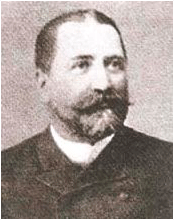 |
 |
 |
 |

The name Ilia Chavchavadze is connected with all significant events in the spiritual life of the Georgian people during the second half of the 19th century, as well as with a whole epoch of Georgian literature. He was born on 27 October 1837 in village of Kvareli to the family of an impoverished noble. His mother died when he was ten, and his father died five years later. The orphaned children were taken in by their aunt, Makrine Chavchavadze-Eristavi. In 1848 Chavchavadze began studying at a private boarding school in Tbilisi, in 1852 he transferred to a Tbilisi gymnasium, and from 1857-61 he studied at the faculty of law at St. Petersburg University, where he was influenced by Russian revolutionary democrats. He was very interested by the ideas of Belinski, Gertsen, Dobrolubov, and Chernishevski. His first critical article started an ideological conflict between the young group “Tergdaleuli” and a camp of conservatives. Despite strict censorship, the “Georgian Herald” periodical, edited by I. Chavchavadze, propagated revolutionary-democratic ideas and a movement against autocracy. He also founded another progressive newspaper, “Iveria”. I. Chavchavadze was a writer and a realist, deeply engaged in social research, psychology, and the lifestyles of all strata of society. The working class provided the main inspiration for his poetry, and many of his works protest the serfdom of the peasantry. Showing the generosity and moral purity of the working class, the writer also described the tyrannical and arbitrary nature of feudal lords in his works “Tale of the Beggar” (1859), “Several Scenes from the Life of a Robber” (1860), and “Is Man Human?” (1859-63). His greatest poems include “Vision” (1872), “Anchorite” (1887), and “Otrai’s Widow” (1887). Chavchavadze tried to instill a spirit of humanism in his readers, and he devoted all of his talent and energy to awakening the consciousness of a nation. In 1863, Ilia Chavchavadze married Olga Guramishvili. To support his family he had to find work first in Kutaisi and then in Dusheti. In 1873 he settled in Tbilisi and actively participated in the public life of that city. In 1875 he was elected the head of the “nobles’ bank”, which as a result of his work practically became a Georgian national bank, providing financial help to the main cultural and educational organizations in Georgia. He became the head of the Georgian dramatic association in 1881, which he helped to found. From 1875-85 he was also a deputy chief of the “literacy propagation organization”, and from 1885 until his death he was the head of this community. Ilia Chavchavadze was devoted to the ideas of education and advancement, and his support for organizations of professional and higher education was limitless. On 30 August 1907, in Tsitsamuri, the bullet of a hired assassin ended the life of this great writer and citizen. “If assassins could, they would kill Georgia” – wrote Vaja Pshavela. Ilia Chavchavadze is interred in the Mtatsminda pantheon.
Back |
 |